dept. heaven | riviera: the promised land
Dept. Heaven resource post series, part 2! This is about Episode I in the series, Riviera: The Promised Land.
The masterpost can be found here!
Warning: This post is image-heavy.
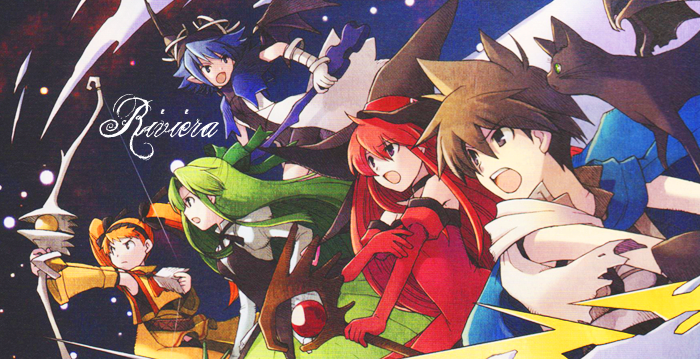
Riviera is Episode I of Dept. Heaven. It has gone through a number of incarnations, released on the WSC in 2002, the GBA in 2004, and the PSP in 2006 (it received a Special Edition second PSP printing in 2007). Battles are partially voiced in the GBA version, while the PSP version features full voice acting.
Iwanaga Yoshinori and Takatsu Yukio were behind the visuals of the WSC version. Starting with the GBA version, illustrator Tobe Sunaho has been in charge of the art, streamlining character designs and redrawing all character portraits and CGs. The PSP version features triple the amount of CGs, along with an extended bonus dungeon that discusses more elements of the whole series’ worldbuilding.
The Story
A thousand years after the end of Ragnarok, Asgard has survived without the gods, but at a cost: Its cultural evolution has slowed, and its stability has weakened without the gods’ guidance. Still, the Seven Magi maintain order throughout the realm.
One day, a report is received that Riviera-one of the mortal worlds, and the place where the gods sealed their power-has become infested with demons. Fearing the start of a second Ragnarok-which Asgard surely would not survive-the Seven Magi decided to use the gods’ power to destroy Riviera preemptively. They awakened a pair of Grim Angels, Ledah and Ecthel, to accomplish this mission.
Although he is considered a weapon with no right to think for himself, Ecthel still has doubts about his mission: While he wants to protect Asgard, he still wonders if there is a way to stop the demons without harming the Sprites who live in Riviera and don’t pose any threat to anyone.
After a certain incident, Ecthel is separated from his friends, and arrives in Riviera alone with his memory damaged. He is adopted by a pair of Sprite girls, and decides to accompany them on their journey to check on a village with which they have lost contact. What happens there causes him to resolve himself to defend Riviera from both Asgard and Niflheim, no matter the cost.
The Main Characters

Ecthel / Ein is the story’s protagonist, a Grim Angel sent on the mission to actuate the Retribution and save Asgard. He gave up his wings for his Diviner. The fine details of his personality and social skills tend to depend on the dialogue choices that the player makes, but overall he is naïve and friendly with a firm sense of right and wrong.
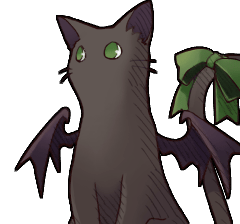
Rose R. Crawford is one of the heroines, Ecthel’s familiar. She looks like a small black cat with bat wings, but hates being called a cat. She wants to become a historian someday, and her favorite hobbies are snarking and taking the mickey out of Ecthel. Hates the dark.
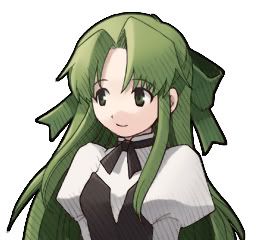
Fia is one of the heroines, a Newtype girl from the village of Elendia. She’s the village elder’s granddaughter. Is usually very polite and is knowledgeable about all kinds of things, and has an obvious fascination with Ecthel. Lives together with Lyuri. Loves sweets; hates meat.
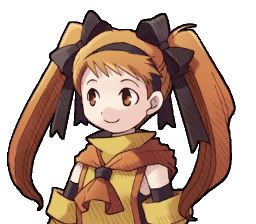
Lyuri / Lina is one of the heroines, a Haine girl from the village of Elendia. She fancies herself a treasure hunter and is always causing trouble. She behaves extremely childishly most of the time, but actually claims to be a year older than Fia, whom she lives with. Loves playing and any and all food, hates scary things.
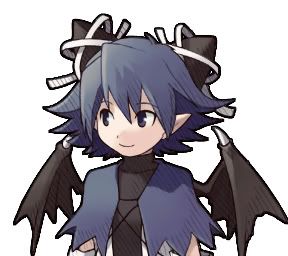
Serene is one of the heroines, an Arc girl from Rosalina Island. All of the Sprites in her village but her had their souls stolen by a mysterious woman. She has a frank, tomboyish personality and seems to be not fully literate. She has an awkward friendship with Lyuri, whom she likes to tease. Loves pranks, is bad at singing.
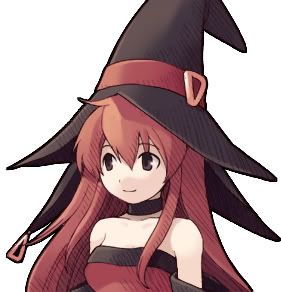
Cierra is one of the heroines, a Witch woman who the party meets in Nelde. She is a witch and magic researcher, but is also a bit absentminded, which sometimes causes her magic to misfire. She’s ordinarily airy and unflappable, but is very powerful in combat. The oldest party member. Loves cats and studying.
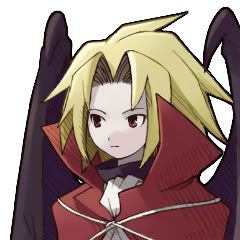
Ledah Rozwelli is a Grim Angel who was sent to Riviera along with Ecthel, though the two of them are separated along the way. He is usually very calm and professional, although he sometimes seems irritated by Ecthel’s inexperience. He tends to accept orders without question. It is unknown what he sacrificed for his Diviner.
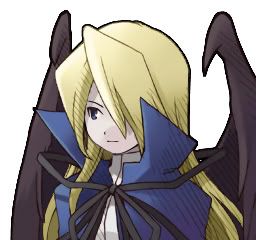
Malice Ructor is a Grim Angel who works separately from Ecthel and Ledah. She is very devoted to Hector, and has a belligerent personality. It is unknown what she sacrificed for her Diviner.
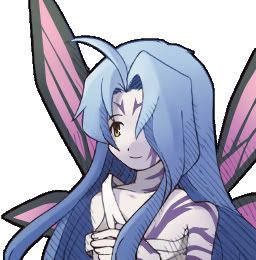
Ursula is a mysterious woman worshipped by the Sprites as a goddess. She seeks to remove the demons from Riviera without actuating the Retribution.
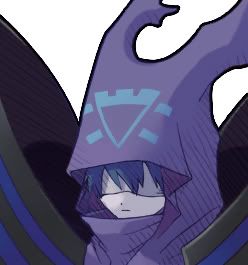
Hector is one of the Seven Magi, and is Ecthel and the other Grim Angels’ boss. He sends them on the mission to actuate the Retribution. Looks like a young man, but is actually over a thousand years old.
The Format
Riviera is a mixture of the traditional turn-based RPG and exploration game genres, like if Myst had battles and minigames instead of puzzles.
The game is divided roughly between dungeon and town segments: In dungeons, you will be able to explore eight or nine sprawling areas, examining details of the scenery and objects that stand out. Every now and then you will run into small button-press minigames, which are necessary for claiming treasure or progressing to special areas; other times you will meet up with enemies and have to battle them. You can save the game between areas of a dungeon, and every time you move to a new screen, your party members will have a conversation.
Once you defeat the final boss of the dungeon, you will be returned to town, where you can talk to the villagers, do simple sub-events, and sometimes exchange items you found in dungeons for better ones before moving to the next dungeon.
Battles are usually required once you run into enemies, although if you retreat from the area you encounter them in repeatedly, there is a chance that they will go away and you can get past peacefully. In battles, you bring along three party members (Ecthel plus two others) and four of the items in your limited inventory. In Riviera, items are not equipped: You simply bring them into battle and use them as necessary. Most items have a limited number of uses, after which they will disappear. On top of this, not every character can use every item-and even if they can, they might get different effects out of it. Items also auto-target. You can see the effects an item will have before you use it.
Characters do not level up through experience-they receive stat boosts from learning special techniques, which you can master by using items they have an affinity with a certain number of times. Thankfully, you don’t have to use up all of your items in normal battles to do this-there’s a “training” option that becomes available partway through an early dungeon that allows you to level grind without wasting items. Powering your party up to their full potential tends to take quite a bit of item collection and level grinding, and managing your inventory is very important to being able to progress successfully throughout the game.
One last important gameplay element is the affection system. Each of the four female active party members has two hidden stats, Mood and Affection, which influence each other. The player’s dialogue choices can increase or decrease these stats, if a girl is defeated in battle her Mood level will decrease, and if she deals the final blow her Mood will improve. While the exact levels can’t be checked, a girl’s status screen will display whether she’s in a good, bad, or neutral mood; the girl who likes Ecthel the most at any given moment will have a different set of Mood icons than the rest. Which girl likes Ecthel the most by the end of the game will impact the ending, while Mood affects a character’s performance in battle.
While you earn points for performing tasks well-getting a high grade on your victories in battle, completing AT minigames-they don’t actually have much meaning other than bragging rights. After you find a special item, you’ll be able to view your top five highest scores.
Finally, there’s an Extra Contents section that unlocks after you beat the game at least once, where you can measure your progress towards 100% completion based on the items, CGs, character portraits, and music you’ve obtained. There are six endings to the game, meaning that 100% completion tends to require at least that many playthroughs, and there’s also quite a lot of replay value to justify it.
Extra Materials
Riviera Official Complete Guide + Illustrations - The PSP game guide/artbook, which contains commentary from Tobe Sunaho and an interview with her and Ito.
Riviera Designer Works - Illustration book with selections of artwork from every version of the game from the WSC to the first PSP version, with extensive commentary about the design process from all of the artists who contributed to the game. Preorder-exclusive bonus goods for the PSP version.
Riviera Introduction Disc - Out-of-print promotional disc with beta versions of the WSC music, arranged tracks, and a drama track.
Riviera Prelude Disc - Filled with various wallpapers by guest artists; came included with the first print of the Japanese GBA version.
Riviera Epilogue Disc - Out-of-print drama CD that came out following the release of the GBA version. Contains voiced versions of all scenes with CGs, four original drama tracks (one canon, which reveals Malice’s backstory), voice actor commentary, and more wallpapers by guest artists.
Riviera: The Precious Chapter - Drama CD that contains the backstories of many characters as well as some missing scenes from the game.
Dept. Heaven World Guidance - Contains worldbuilding digest, terms glossary, and a behind-the-scenes column with Ito.
The masterpost can be found here!
Warning: This post is image-heavy.
Riviera is Episode I of Dept. Heaven. It has gone through a number of incarnations, released on the WSC in 2002, the GBA in 2004, and the PSP in 2006 (it received a Special Edition second PSP printing in 2007). Battles are partially voiced in the GBA version, while the PSP version features full voice acting.
Iwanaga Yoshinori and Takatsu Yukio were behind the visuals of the WSC version. Starting with the GBA version, illustrator Tobe Sunaho has been in charge of the art, streamlining character designs and redrawing all character portraits and CGs. The PSP version features triple the amount of CGs, along with an extended bonus dungeon that discusses more elements of the whole series’ worldbuilding.
The Story
A thousand years after the end of Ragnarok, Asgard has survived without the gods, but at a cost: Its cultural evolution has slowed, and its stability has weakened without the gods’ guidance. Still, the Seven Magi maintain order throughout the realm.
One day, a report is received that Riviera-one of the mortal worlds, and the place where the gods sealed their power-has become infested with demons. Fearing the start of a second Ragnarok-which Asgard surely would not survive-the Seven Magi decided to use the gods’ power to destroy Riviera preemptively. They awakened a pair of Grim Angels, Ledah and Ecthel, to accomplish this mission.
Although he is considered a weapon with no right to think for himself, Ecthel still has doubts about his mission: While he wants to protect Asgard, he still wonders if there is a way to stop the demons without harming the Sprites who live in Riviera and don’t pose any threat to anyone.
After a certain incident, Ecthel is separated from his friends, and arrives in Riviera alone with his memory damaged. He is adopted by a pair of Sprite girls, and decides to accompany them on their journey to check on a village with which they have lost contact. What happens there causes him to resolve himself to defend Riviera from both Asgard and Niflheim, no matter the cost.
The Main Characters
Ecthel / Ein is the story’s protagonist, a Grim Angel sent on the mission to actuate the Retribution and save Asgard. He gave up his wings for his Diviner. The fine details of his personality and social skills tend to depend on the dialogue choices that the player makes, but overall he is naïve and friendly with a firm sense of right and wrong.
Rose R. Crawford is one of the heroines, Ecthel’s familiar. She looks like a small black cat with bat wings, but hates being called a cat. She wants to become a historian someday, and her favorite hobbies are snarking and taking the mickey out of Ecthel. Hates the dark.
Fia is one of the heroines, a Newtype girl from the village of Elendia. She’s the village elder’s granddaughter. Is usually very polite and is knowledgeable about all kinds of things, and has an obvious fascination with Ecthel. Lives together with Lyuri. Loves sweets; hates meat.
Lyuri / Lina is one of the heroines, a Haine girl from the village of Elendia. She fancies herself a treasure hunter and is always causing trouble. She behaves extremely childishly most of the time, but actually claims to be a year older than Fia, whom she lives with. Loves playing and any and all food, hates scary things.
Serene is one of the heroines, an Arc girl from Rosalina Island. All of the Sprites in her village but her had their souls stolen by a mysterious woman. She has a frank, tomboyish personality and seems to be not fully literate. She has an awkward friendship with Lyuri, whom she likes to tease. Loves pranks, is bad at singing.
Cierra is one of the heroines, a Witch woman who the party meets in Nelde. She is a witch and magic researcher, but is also a bit absentminded, which sometimes causes her magic to misfire. She’s ordinarily airy and unflappable, but is very powerful in combat. The oldest party member. Loves cats and studying.
Ledah Rozwelli is a Grim Angel who was sent to Riviera along with Ecthel, though the two of them are separated along the way. He is usually very calm and professional, although he sometimes seems irritated by Ecthel’s inexperience. He tends to accept orders without question. It is unknown what he sacrificed for his Diviner.
Malice Ructor is a Grim Angel who works separately from Ecthel and Ledah. She is very devoted to Hector, and has a belligerent personality. It is unknown what she sacrificed for her Diviner.
Ursula is a mysterious woman worshipped by the Sprites as a goddess. She seeks to remove the demons from Riviera without actuating the Retribution.
Hector is one of the Seven Magi, and is Ecthel and the other Grim Angels’ boss. He sends them on the mission to actuate the Retribution. Looks like a young man, but is actually over a thousand years old.
The Format
Riviera is a mixture of the traditional turn-based RPG and exploration game genres, like if Myst had battles and minigames instead of puzzles.
The game is divided roughly between dungeon and town segments: In dungeons, you will be able to explore eight or nine sprawling areas, examining details of the scenery and objects that stand out. Every now and then you will run into small button-press minigames, which are necessary for claiming treasure or progressing to special areas; other times you will meet up with enemies and have to battle them. You can save the game between areas of a dungeon, and every time you move to a new screen, your party members will have a conversation.
Once you defeat the final boss of the dungeon, you will be returned to town, where you can talk to the villagers, do simple sub-events, and sometimes exchange items you found in dungeons for better ones before moving to the next dungeon.
Battles are usually required once you run into enemies, although if you retreat from the area you encounter them in repeatedly, there is a chance that they will go away and you can get past peacefully. In battles, you bring along three party members (Ecthel plus two others) and four of the items in your limited inventory. In Riviera, items are not equipped: You simply bring them into battle and use them as necessary. Most items have a limited number of uses, after which they will disappear. On top of this, not every character can use every item-and even if they can, they might get different effects out of it. Items also auto-target. You can see the effects an item will have before you use it.
Characters do not level up through experience-they receive stat boosts from learning special techniques, which you can master by using items they have an affinity with a certain number of times. Thankfully, you don’t have to use up all of your items in normal battles to do this-there’s a “training” option that becomes available partway through an early dungeon that allows you to level grind without wasting items. Powering your party up to their full potential tends to take quite a bit of item collection and level grinding, and managing your inventory is very important to being able to progress successfully throughout the game.
One last important gameplay element is the affection system. Each of the four female active party members has two hidden stats, Mood and Affection, which influence each other. The player’s dialogue choices can increase or decrease these stats, if a girl is defeated in battle her Mood level will decrease, and if she deals the final blow her Mood will improve. While the exact levels can’t be checked, a girl’s status screen will display whether she’s in a good, bad, or neutral mood; the girl who likes Ecthel the most at any given moment will have a different set of Mood icons than the rest. Which girl likes Ecthel the most by the end of the game will impact the ending, while Mood affects a character’s performance in battle.
While you earn points for performing tasks well-getting a high grade on your victories in battle, completing AT minigames-they don’t actually have much meaning other than bragging rights. After you find a special item, you’ll be able to view your top five highest scores.
Finally, there’s an Extra Contents section that unlocks after you beat the game at least once, where you can measure your progress towards 100% completion based on the items, CGs, character portraits, and music you’ve obtained. There are six endings to the game, meaning that 100% completion tends to require at least that many playthroughs, and there’s also quite a lot of replay value to justify it.
Extra Materials
Riviera Official Complete Guide + Illustrations - The PSP game guide/artbook, which contains commentary from Tobe Sunaho and an interview with her and Ito.
Riviera Designer Works - Illustration book with selections of artwork from every version of the game from the WSC to the first PSP version, with extensive commentary about the design process from all of the artists who contributed to the game. Preorder-exclusive bonus goods for the PSP version.
Riviera Introduction Disc - Out-of-print promotional disc with beta versions of the WSC music, arranged tracks, and a drama track.
Riviera Prelude Disc - Filled with various wallpapers by guest artists; came included with the first print of the Japanese GBA version.
Riviera Epilogue Disc - Out-of-print drama CD that came out following the release of the GBA version. Contains voiced versions of all scenes with CGs, four original drama tracks (one canon, which reveals Malice’s backstory), voice actor commentary, and more wallpapers by guest artists.
Riviera: The Precious Chapter - Drama CD that contains the backstories of many characters as well as some missing scenes from the game.
Dept. Heaven World Guidance - Contains worldbuilding digest, terms glossary, and a behind-the-scenes column with Ito.